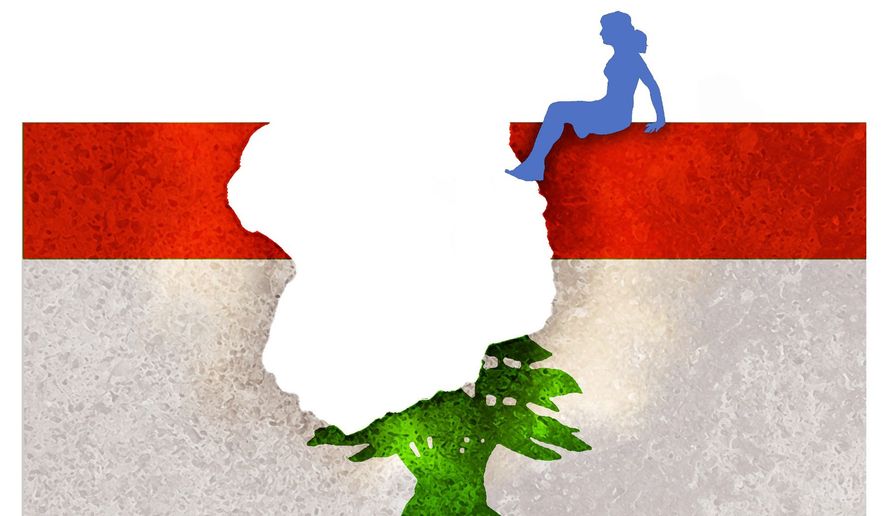OPINION:
People forget that Beirut, Lebanon, was once known as The Paris of the Middle East. My friend Nada remembers.
Nada was having coffee at a shopping mall last month when explosions at Beirut’s port turned much of the city into rubble. She crawled under a table just seconds before a sheet of aluminum fell where she had been seated.
The explosions came from the 2,750 tons of ammonium nitrate stored at the port. The blasts left hundreds of people dead, 6,000 injured and 300,000 homeless.
On the way home, as Nada meandered through bodies and rubble and pools of blood, she had the fortitude — reminiscent of Zeno of Citium, the ancestrally Phoenician founder of the Stoic school of philosophy — to call her family and me to say she was alive. When she arrived at her apartment it was gone. Two of her neighbors died, a person who works for her had been taken to the hospital with injuries, and news soon reached her of a dead friend and several other injured acquaintances.
Nada sits on permanent danger, like a Pele, the mythological Hawaiian goddess of fire and volcanoes sitting on the crater of Kilauea. She already had survived Lebanon’s 15-year civil war (1975-89) and the 2006 Israeli-Hezbollah conflict, which announced itself by shattering the balcony of her house. But how long can her luck last?
Accidental or not, the Beirut blast rekindled the public’s rage against Lebanon’s political elite, forcing the government’s resignation. The protesters wanted the entire political establishment out. But the fact is: Those in charge, as corrupt as they may be, are not the cause of Lebanon’s problems — they’re a symptom of what’s wrong.
Many observers point to the Lebanese system of “confessionalism,” which apportions political power proportionally among religious groups, as the underlying problem. They trace confessionalism to the 1989 Taif Accords, which ended the civil war. But that ignores history. Confessionalism has existed in Lebanon for hundreds of years: both before and during the Ottoman Empire’s rule (1516-1918), during the French Mandate period (1920-1943), and in the years since Lebanon gained independence.
Contrary to what many other observers suggest, confessionalism also is just a symptom, not the root cause of Lebanon’s continuing grief.
Because all of Lebanon’s factions had a common interest in getting rid of colonial rule, independence ushered in a long period of coexistence after 1943. For several decades, Lebanon was the Middle East’s shining star: tolerant and urbane. But confessionalism never disappeared. Christians maintained a small advantage in the distribution of power, but eventually the system led to the civil war.
The Taif Accords, which ended that war, called for parity between Muslims and Christians. The agreement may have helped maintain the peace, but it hastened the failure of the state.
Despite toothless attempts to diminish sectarianism, religious-based groups — often aligned with foreign powers — controlled everything from family law to access to food, housing and other goods and services. There were strings attached, of course: allegiance to faction. And while other factions disarmed, the most virulent, Hezbollah (“Party of God”), never did.
This is the system that produced the financial Armageddon that has roiled the country. Since 1997, Lebanon’s currency has been pegged to the U.S. dollar, something usually done to stabilize the currency or promote artificial prosperity. The trick is producing enough dollars to sustain the exchange rate, something Lebanon was able to do for many years through tourism, cash from Lebanese citizens living abroad and from real estate sales.
When those dollars dwindled, Lebanon responded with a Ponzi scheme, with the Bank of Lebanon, the country’s central bank, offering risibly high interest rates to commercial banks in order to get foreign currency, and the commercial banks offering absurdly high interest rates to their customers (and rewarding their executives with huge bonuses for these shenanigans). To top it off, the government incurred huge budget deficits and one of the world’s largest debts as a percentage of gross domestic product. Then the bills came due. The currency collapsed, a large percentage of the population succumbed to poverty and basic services became scarce. That’s where things stand today.
But confessionalism also is not the root cause of this tragedy. Like the financial crisis and the political failure, it is a symptom. The real cause is the idea that Lebanese society and political power need to be organized according to an artificially contrived formula that allocates power among groups — in this case, sectarian groups.
In fact, the only solution to Lebanon’s grief is to base power on the individual, a system under which every man and woman, regardless of the group to which they belong, is equal under the law — and that law stands above and apart from any group or faction. Lebanon needs to desacralize its groups and sects as a source of state-like power and make the individual the basis of power. Then people will be free to associate, peacefully and successfully, according to any affinity they choose, including, if they wish, religion or ethnicity.
The absence of individual rights is the root cause of the Lebanese tragedy; confessionalism is a consequence. Only when individual rights are recognized as the basis of political authority will Lebanon, a bewitchingly beautiful country — a mosaic that reconciles some of the highest Western virtues with some of the best of the East — liberate itself. Until then, I will continue to fear for Nada’s life.
• Alvaro Vargas Llosa is a senior fellow with the Independent Institute, Oakland, California. His latest book is “Global Crossings: Immigration, Civilization and America.”




Please read our comment policy before commenting.